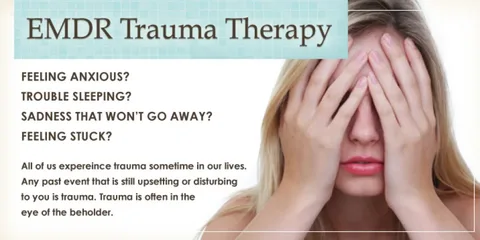Whether it’s a childhood trauma or witnessing violence, experiencing traumatic events can affect your mental health. Trauma therapy can help you recover from the symptoms caused by your traumatic experiences.
It’s important to work with a therapist who is trained in treating trauma and PTSD. The relationship between you and the therapist is also very important, so find someone you feel comfortable with.
Symptoms of trauma
If you are experiencing symptoms of trauma, it is important to find help as soon as possible. This will increase your chances of a successful recovery.
Symptoms of trauma may start immediately following a traumatic event, or they may develop over time. Some symptoms go away on their own within a few weeks or months. Other symptoms, however, can persist and result in post-traumatic stress disorder (PTSD).
People who are dealing with a traumatic event often experience emotional symptoms such as anxiety, depression, sadness, anger, or numbness. Those who suffer from PTSD also tend to have intrusive thoughts and memories of the traumatic event.
Trauma can be triggered by a range of events, from an accident to sexual assault to being subjected to violence or discrimination. It can happen to anyone, regardless of race, ethnicity, sex, age, gender identity, or background.
A person’s reaction to trauma can depend on a number of factors, such as the type of traumatic event they suffered from, how long it took them to recover, and whether they were physically or emotionally injured. It can also be affected by their social and family life.
There are a number of different types of therapy that can be used to treat trauma, including psychotherapy and cognitive behavioral therapy. Both have shown promising results in their studies.
In psychotherapy, you meet with a mental health professional to talk about your traumatic experiences and work through healing strategies. The relationship between you and your therapist is crucial. This is especially true in trauma therapy, as you will be sharing your traumatic experience with someone you trust.
If you are considering treatment, it is important to work with a therapist who understands the impact of trauma on the brain and can tailor their approach to your unique needs. It is also important to find a therapist who has experience treating trauma and PTSD.
For many people, online trauma counseling is a more convenient option than in-person sessions. It also takes the edge off the discomfort of talking about difficult topics with a stranger and can be done from the comfort of your home.
Symptoms of PTSD
When you’re experiencing symptoms of PTSD, it may be hard to know when to seek help. Symptoms usually begin within a few weeks or months after the traumatic event but can also last for years. If you’re experiencing symptoms that don’t go away or worsen, it’s time to see a trauma counselor.
The symptoms of PTSD are similar to those of normal anxiety or depression, but the person with PTSD experiences them in more intense ways and for longer periods. These symptoms can interfere with their everyday lives and cause distress.
One common symptom is re-experiencing traumatic events, such as having distressing flashbacks or nightmares. Other symptoms include negative thoughts about the traumatic event and feelings of arousal and fear, such as feeling jumpy or easily startled.
People with PTSD often try to avoid people, places, or situations that remind them of the trauma. This is called avoidance, which can lead to a constricted life.
PTSD can also change your thinking and behaviors, such as blaming yourself or others for the traumatic event. It can make it harder to function in your daily life, which may lead to poor health or even suicide.
Another symptom is emotional numbing, where you don’t feel or express emotions. You might also stop doing things you used to enjoy. This can lead to isolation or a loss of interest in your family and friends.
A mental health professional can tell you if you have PTSD by looking at your symptoms and asking questions about the traumatic event. They’ll also ask how long the symptoms have been occurring, how often, and how severe they are.
Treatment can vary depending on the symptoms and how severe they are, but two types of treatments are often effective: psychotherapy (talk therapy) and medication. In addition, your therapist can work with you to learn skills to help you manage your symptoms and live a better, more satisfying life.
Online telehealth sessions are an increasingly popular way to receive trauma counseling for many people, and they can be more convenient than in-person meetings. They’re also a good option for those who don’t have the time or desire to travel to their therapist’s office.
Symptoms of anxiety
If your feelings of fear, anxiety, or distress are causing serious problems in your life, you may need trauma therapy. You could also need it if you are dealing with PTSD (post-traumatic stress disorder), which can be difficult to treat on your own.
Trauma can happen when you experience a life-threatening event or a situation that makes you feel helpless, threatened, or unsafe. It can occur from one-time events, such as a car accident or an attack, and ongoing stress, such as living in a dangerous neighborhood or fighting a chronic illness.
The traumatic experience affects you in many ways, including your ability to handle stress and your emotional well-being. For example, a traumatic experience can lead to PTSD symptoms such as flashbacks, intrusive thoughts, or avoiding situations that remind you of the traumatic event.
These can cause severe anxiety, depression, and difficulties with relationships. The symptoms may also impact your physical health and make it hard to sleep or stay focused on tasks.
It can also be difficult to enjoy activities that you normally enjoy, such as playing games or making music. You may also be less interested in socializing with friends and family.
People who have experienced a traumatic event can develop phobias, which are intense fears of specific objects or situations that may be connected to the traumatic experience. For example, you may be afraid of deep water or a buried body or have a phobia of being on an airplane or in public places.
You may also notice changes in your arousal and reactivity, such as being irritable, angry, or easily startled. These symptoms can be a sign that you need trauma therapy to restore your mental and emotional balance.
Some of the most effective forms of trauma therapy include prolonged exposure (PE), cognitive processing therapy, and a form of cognitive behavioral therapy called trauma-focused cognitive behavior therapy (TF-CBT). Other forms of trauma-focused treatment are available, as well, such as medication and family counseling.
While there is no definitive answer to the type of trauma therapy that works best, it can be helpful to choose a therapist who specializes in treating PTSD and other related issues. They will understand how the traumatic event affected you and help you address the negative emotions, thoughts, and beliefs that are keeping you stuck in your traumatic experiences. They will also teach you healthy coping skills and techniques to help you deal with the emotions that keep you from enjoying your life.
Symptoms of depression
Depression is a mental illness that can occur after trauma or other stressful events. Genetics, the environment, or other medical conditions can cause it. It is characterized by feelings of sadness and loss of interest in activities that used to bring you joy. It can also interfere with your daily life and lead to thoughts of suicide.
Symptoms of depression can start a few days after the event and last for weeks or months. If you have these symptoms for more than two weeks or if they begin to interfere with your everyday life, you should seek help.
Many people who experience a traumatic event recover without problems, but some develop post-traumatic stress disorder (PTSD). This condition can affect anyone, regardless of age or gender. It can happen after a disaster, injury, death, or other traumatic experience.
Some of the symptoms of PTSD include nightmares, flashbacks, and other memories that are so scary or upsetting that they cause you to worry about them or have trouble sleeping. Other symptoms include feelings of anger, rage, or anxiety.
Survivors of sexual abuse may have an increased risk for PTSD and other mental health disorders. Studies show that men and women who have been abused are 1.8 times more likely to develop depression later in life than those who were not.
Psychotherapy and medication are both effective treatment options for depression and PTSD. In fact, a study found that between 77% and 100% of patients who undergo trauma-focused therapy experiences a reduction in their symptoms.
Trauma therapy helps you process the trauma and learn new coping skills to deal with the symptoms that result from it. It can also help you work through your fears and equip you with a plan to manage your symptoms on a daily basis so that you can move forward with your life.
It can also help you overcome unhealthy habits that are associated with your trauma and PTSD. Some of these habits include using alcohol and drugs, which can make the symptoms worse. Other ways to manage trauma and depression symptoms are avoiding places that remind you of the trauma and reconnecting with old friends.










